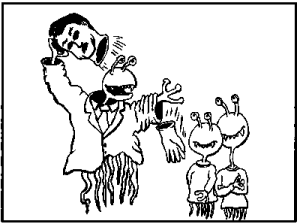by Jason Campbell
The unreliable narrator is a common trope in fiction, so can it be used well in a RPG adventure? The answer is yes, but certain precautions should be considered.

Readers Versus Players
In fiction an unreliable narrator can be used to add a twist to the story. When the reader encounters this, that surprise can seem clever. Readers often find unexpected twists in the plot to be rewarding.
In a RPG you have players instead of readers, and this change is something to keep in mind for the game master. RPG players often view NPCs as the voice of the game master. While readers enjoy being tricked by a character who turns from reliable to a villain, the effect can be different for players. Players who are surprised when an NPC turns from a reliable ally to a lying villain might feel that the game master has betrayed them, not just the NPC.
Setting the Stage For an Unreliable NPC
In a long form campaign the game master can set up the idea that not all NPCs are trustworthy early on. The easiest way to have this happen is in the early stages of a campaign, with something that’s only a minor detail, and using two NPCs to resolve the issue. If this happens early the players will learn that not every NPC speaks for the game master, so that when it happens with a larger conflict later they won’t feel cheated by the scenario.
Choosing a minor situation to do this is important, so that the stakes aren’t world breaking. Perhaps the PCs are investigating a murder and hear a clue from a merchant. Shortly after they meet another NPC, a town official, who refutes the merchant’s statement and says that the merchant is a known liar. The NPCs can have a confrontation where the merchant’s motivation to lie is exposed. Meanwhile the PCs find the clues they need to solve the mystery.
Conclusion
The goal of the above situation is to show the players that some NPCs may not be trustworthy, but others are. In this way when the Prince turns out to be a fiendish cultist they don’t feel cheated. It’s important that the players are allowed to find clues about the Prince that confirm any suspicions they have. There’s a difference between an unreliable narrator and pulling the rug from under the PCs constantly. The common scenario where the person who hired the PCs initially is actually the big bad guy is overdone and can be frustrating. The unreliable narrator shouldn’t rise to that level of betrayal, it’s the idea that not every word from every NPC should be taken literally.
What do you think? Have you ever used or seen an unreliable NPC? Let us know!






Another approach is found in the board game Detective: City of Angels. In this mystery board game virtually all NPCs are inconsistently reliable and unreliable. There are mechanics in place to “turn” an unreliable NPC into a reliable one. Part of the fun in the game is discovering and turning the unreliable NPCs.